Local News
Nancy Hughes to retire as executive director of Shalom Residences after 31 years in that role
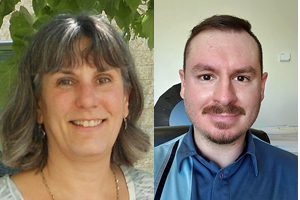
By BERNIE BELLAN The longest-serving current executive director of any of the Jewish Federation’s beneficiary agencies will be stepping down as of April 1, when Nancy Hughes, the executive director of Shalom Residences, will be retiring. Into her role will be stepping Michael Goldberg, who is someone who brings with him a great deal of experience in the fields of gerontology and palliative care.
With 31 years as executive director of an organization that opened its first residential home back in 1980, Nancy has seen many changes in Shalom Residences, including presiding over a doubling of the number of homes operated by the organization during her time as executive director (from three to six).
There were 15 residents altogether when Nancy first stepped into the role of Shalom Residences executive director, she told me told me during a phone conversation I had with her and Michael Goldberg on Thursday, March 17.
The very first Shalom Residence was on Cathedral Avenue, Nancy explained. (That home was later sold and a different home on McAdam Avenue was purchased.) Other homes are on Enniskillen Avenue, Hartford Avenue, Seven Oaks Place – all in West Kildonan; on Daffodil – in Garden City; and the newest home, on Oxford Street, in River Heights.
“Most of the residents were younger when I started,” Nancy observed. “Now, most are over 40.” Sadly, a number of the residents who had been living in Shalom Residences when Nancy began her tenure as executive director have passed on. Three of the original residents of Shalom Residences still remain as residents, however, Nancy told me.
Although most readers are probably familiar with what Shalom Residences offer, here are some points taken from the organization’s website about its goals, which are:
“To support people with intellectual disabilities in the mainstream of community life so that they may conduct their lives in a meaningful dignified way.
“To enable people with intellectual disabilities to become as self-sufficient as possible.
“To create and maintain Judaic oriented programs for people with intellectual disabilities which reflect the philosophy of Shalom Residences Inc.
“To develop community awareness of, and increase community acceptance of, people with intellectual disabilities as full and equal citizens.
“To enable the persons in Shalom Residences’ programs to achieve their potential as contributing members of our community, and to become as self sufficient as possible.”
Currently Shalom Residences have a total of 31 individuals receiving some sort of assistance, ranging from helping individuals still living at home with their parents who are not quite ready to take the step of living in another home (four individuals); to individuals living in apartments (eight); to individuals living with other residents in one of the six homes operated by Shalom Residences (19 currently).
(By the way, one needn’t be Jewish in order to qualify for residency in a Shalom Residence.)
There are currently vacancies in three of the homes operated by Shalom Residences, Nancy noted. Although it is not unusual for Shalom Residences to have vacancies at any given time, Nancy explained, with the onset of Covid in 2020 a number of parents who might otherwise have wanted to place a child in one of the homes drew back from doing so out of fears that their loved one might contract Covid.
As a result, when I asked Nancy whether there are any plans to acquire more homes, she said that “the priority would be to fill our existing vacancies.”
And, while Covid has certainly had a long lasting impact upon just about everyone, the dampening effect it has had upon individuals with intellectual disabilities had been particularly hard felt.
(I noted, in talking with Nancy and Michael, that I had actually been in attendance at the last social event in which residents of Shalom Residences were all able to mingle together in one place when I was at a Chanukah party held at 1010 Sinclair on December 18, 2019. Who would have thought that we were about to enter into a long period of social isolation soon thereafter?)
In Michael Goldberg, however, Shalom Residence has lucked out in being able to recruit an individual with outstanding credentials.
The son of Mark and Catherine Goldberg, Michael attended Ramah Hebrew School, Gray Academy, and the University of Winnipeg Collegiate, he told me.
Michael added that he attended university in South Carolina, where he obtained a bachelors degree in Psychology. (He noted that he had actually gone to university on a golf scholarship!)
Later, Michael said, he obtained his masters degree in Gerontology.
For the past seven years, he said, he had been working at Deer Lodge Palliative Care. Beginning in March he started with Shalom Residences, becoming acquainted with his new role under Nancy’s tutelage.
Even before coming to Shalom Residences, Michael says that he had developed a familiarity with the program, as he “was able to facilitate courses in compassionate care for Shalom Residences staff members.”
And, while Michael may not have had first hand experience dealing with budgetary matters until now, he’s sure to become acquainted with the pressures that come with having to provide services under tight constraints.
Although Shalom Residences receive funding from a variety of sources, including the Jewish Federation and the Jewish Foundation, “90% of the funding comes from the provincial government” Nancy explained. (Also, a certain amount of money is raised by the Shalom Residences Foundation. Prior to Covid there was an annual in person fund raiser held by that foundation. Nancy says the plan is to have one once again this year.)
But, “funding from the government has become tighter and tighter,” Nancy noted.
In fact, the trend of late has been for the government to prefer offering “respite care” for individuals within their parents’ homes rather than having them placed in a Shalom Residence, Nancy said.
Aside from that trend, I asked Nancy whether there are any noticeable changes that she’s seen in terms of providing care for adults with intellectual disabilities during her 31 years as Shalom Residences executive director?
“There’s been a lot more emphasis placed on respecting rights and the right to make choices,” she answered.
And, as far as staffing goes, I’ve witnessed the dedication of many different staff over the years in different Shalom Residences. Currently there are 30 full time and 40 part-time staff, Nancy said.
But, as the longest serving member of Shalom Residences staff, Nancy Hughes has definitely left her mark on an organization that has been filling a vital role within the Jewish community for 42 years now.
Local News
New Israeli restaurant opens in River Heights

By BERNIE BELLAN (July 6, 2025) It’s been a long time since our community has been able to welcome the opening of a restaurant that specializes in Israeli food.
That void is now going to be filled with the opening of The Green Falafel, at 1833 Grant (corner of Centennial – next to the Subway).
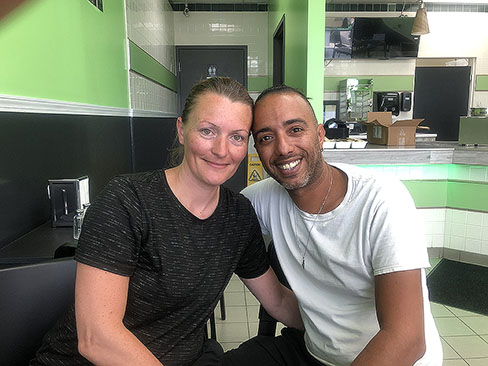
The restaurant is the fulfillment of a dream long held by the husband and wife team of Ariel and Eden Maudi, who have been living in Winnipeg the past 11 years.
Ariel, who was born in Israel and grew up in Beer Sheva, says that he worked in telecommunications in Ramat Gan for several years. He adds though that he had always dreamed of owning his own falafel stand in Israel, but life was difficult there and he decided to come to Canada as a tourist to see whether there were any opportunities here for him, Eden and their two young children.
Eden, who was born in Russia and moved to Israel with her family in 1996, stayed behind with the two kids, who were both pre-schoolers, while Ariel tested the waters in Canada first.
Ariel says he came to Canada as a tourist in 2013. His first stop was in Toronto, where he acquired his 1st class driver’s license. At the end of 2013 he moved to Winnipeg where he began working as a truck driver. Soon he found himself employed as a successful sales person at Vickar Nissan where, he says, he once achieved the status as the top car sales person in Canada. After working at Vickar Nissan for a number of years, Ariel began working as an installer for Bell MTS.
Meanwhile, Eden began working at a Walmart, later at the Costco on Regent.
But, when the opportunity to move into a space that had been previously occupied by another restaurant, but which had closed, became available, Ariel and Eden decided to open their own Israeli restaurant in an area that hadn’t seen Israeli food served since the controversial closure of Bermax Café in 2019.
The Maudis say that they will be serving a variety of Israeli dishes – all vegetarian, and that they will be fully kosher.
The “green” in Green Falafel, by the way, Ariel Maudi explains, comes from the cilantro and parsley that are added to the chickpeas. In addition, their pitas will be coming from Israel and will be baked fresh daily.
The Green Falafel will be open from 10-8 daily. Delivery will be available through Uber Eats and DoorDash.
Call 204-557-7837 for information.
Local News
Previews of shows with Jewish performers at this year’s Fringe Festival July 16-27

For show dates and venues go to winnipegfringe.com
By BERNIE BELLAN As has been our custom for many years now we try to find shows that have either Jewish performers or themes that would have particular appeal for Jewish audiences. Many of the Jewish performers at this year’s festival have been here before, but several are new. In no particular order here are blurbs about the shows we’ve found that fit the criteria I’ve just described. (By they way, if we’ve omitted a show that should be included in our list there’s plenty of time to get added to this post. Just drop me a line at jewishp@mymts.net.)

You’ve Been Served: A One-Woman Show About Divorce, Cults, and Coming of Age at Midlife
Noemi Zeigler
You are hereby summoned… to laugh, cry, and maybe belt out a Streisand number in solidarity. You’ve Been Served is a raw and riotous solo comedy by writer-performer Noemi Zeigler. It all begins when Noemi is served divorce papers on top of a garbage bin lid while taking out the trash—an undignified start to a full-blown midlife unraveling.
At 50, still clinging to her dream of becoming a singer, she falls under the spell of a music producer slash self-help guru, joins a spiritual cult, and, instead of landing a record deal, she lands in jail. Behind bars, with help from her long-buried inner child, she begins to reclaim her voice and her power. Turns out, dreams really do come true—just not the way she expected.
The show features vividly drawn characters—including a manipulative cult leader, a toxic ex-husband, and a jail guard named Roach who shares Noemi’s obsession with the fashion of Charlie’s Angels (the ‘70s TV version, of course.)
With salsa dancing, twerking, and a belting rendition of Don’t Rain on My Parade, Zeigler dives into abandonment, reinvention, and self-rescue. As she confronts perimenopause, she discovers it’s not the end—it’s the new puberty. The show touches on grief, sexuality, and spiritual confusion, but Noemi’s childlike optimism asks: What if your breakdown is actually your breakthrough?
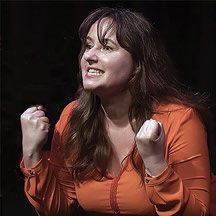
You’re good for nothing… I’ll milk the cow myself
Written & Performed by Natacha Ruck
France, 1981: The first socialist president is about to be elected and young Natacha is ready to implement her own political platform. But first, she has to take down the schoolyard bully,emasculate the rules of French grammar and make off with grandmother’s chocolate.
If you think you know the limits of Jewish mothers, evil grandmothers and transcontinental lovers, meet Natacha Ruck’s family. This true tale of three generations of women, facing three world wars, is equal parts hilarious, shocking and zany.

A One Human Being, Potentially Comedic Performance of Beauty and the Beast NEW WORK!
Written & Performed by Alli Perlov
Be our guest! Local high school drama teacher Alli Perlov is back for a tale as old as time. Can she sing? Not really. Can she act? That’s debatable. Will you laugh? Oh… probably.
Perlov plays dozens of characters, some human, some animal, and many objects, in a comedic exploration of Beauty and the Beast.
In an homage to this brilliant musical adventure, through witty commentary and unstoppable energy, Perlov aims to entertain an audience that isn’t forced to be there like her students.

Hockey Sticks and Beaver Pie
Written & Performed by Melanie Gall
Take a trip around Manitoba. From the 30,000 ft. St. Adolphe snow maze to the Narcisse snake dens! After all, where else holds both the title of Slurpee Capital of the World and the Guinness Record for the most people simultaneously howling like wolves?
Deanna Durbin, Terry Jacks and Burton Cummings are among the many homegrown stars, and Hockey Sticks features their music along with original songs and the stories that make this province unique.
Starring Melanie Gall from past shows Piaf & Brel, Ingenue and Toast to Prohibition
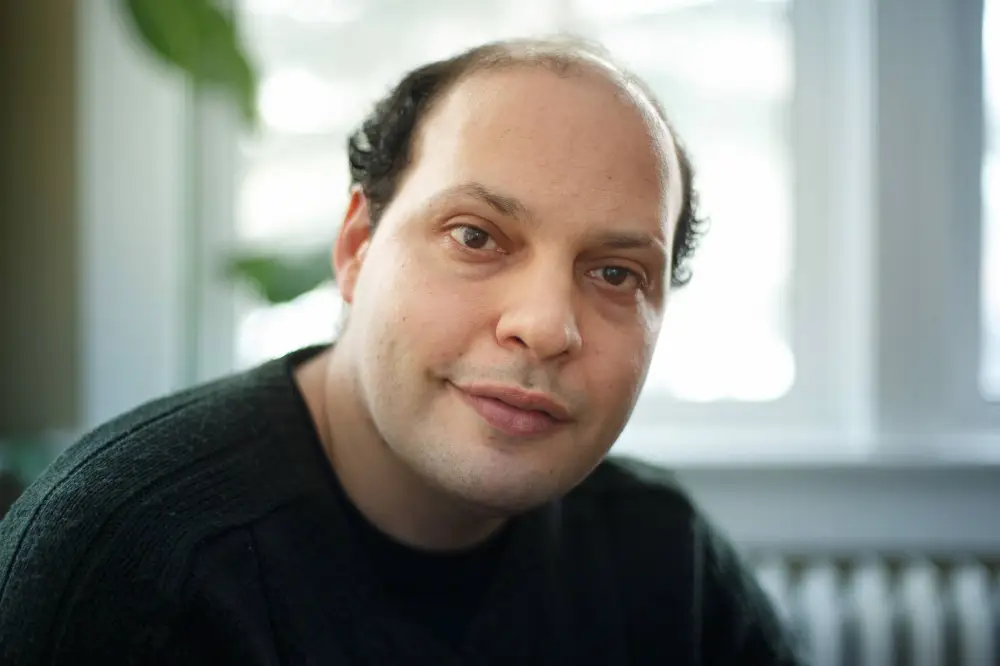
Nerohilarity Exposed
Produced by Adam Schwartz
We all sometimes feel exposed, whether that’s as a fraud or a pretender.
The performers of the award-winning Neurohilarity show, Danielle Kayahara (Laugh Out Loud CBC), Carole Cunningham (Yuk Yuks, The Debaters), Adam Schwartz (Winnipeg Fringe) and Rollin Penner (Yuk Yuks, CBC, Rumors, Winnipeg Comedy Festival), apply a comedic spin to the experiences that make us feel insecure, stripping away the emotional weight with nittygritty jokes and stories that will have you laughing uproariously.
Brilliantly awkward.

A Lesbian in the Kitchen
Willow Rosenberg
Professional lesbian Willow Rosenberg takes you on a journey through the centuries, superstitions and tablespoons of her lifelong passion for baking in this spiritual successor to 2024’s Jenny Award-nominated A Lesbian in a Bear Store.
Whether you have a favourite spatula, bake once or twice a year, or live in constant fear of being told to “just fold it in”, this one-woman show about family, joy, tradition (but make it gay),
Judaism, comfort, home (but make it gayer*), love, chemistry and magic is for you!
*Who’re we kidding, it’s all gay!

Eleanor’s Story: An American Girl in Hitler’s Germany
Written & Performed by Ingrid Garner
(Ed. note: Although Ingrid Garner isn’t Jewish, we thought the theme of this show might have a special appeal for Jewish readers.)
Based on Eleanor Ramrath Garner’s best-selling memoir, this 16x internationally award-winning adaptation – performed by her granddaughter, Ingrid Garner – details Eleanor’s youth as an American caught in Second World War Berlin.
Punctuated with humour and accompanied by cinematic sound and video, Garner embodies her ancestors in this coming-of-age odyssey, delivering an account of war that is more relevant than ever.

Reviewing The Free Press 2
Benji Rothman
The Winnipeg Free Press has run amok, reviewing each and every Fringe show over the past two decades without consequence or recourse. Now, it’s their turn… again.
In this refurbished work that debuted at last year’s Winnipeg Fringe, Benji Rothman once again takes the Winnipeg Free Press to task. In this (mostly) new, (hopefully) hilarious 45-minute show, Rothman dives deep into their past and exposes their faulty journalism, imbalanced reporting and, of course, embarrassing typos.
Local News
Jewish performers at this year’s Winnipeg Folk Festival July 10-13

The Black Sea Station
Long ago, there were the klezmorim, itinerant musicians who roamed the back streets of Eastern Europe, playing at parties for meals and a few coins. The sound they honed then was a visceral exploration of life’s joy, and its loss; they could whip audiences into a frenzy of dancing, or bring them to tears with the mournful wail of a clarinet. Today, Winnipeg’s own The Black Sea Station is carrying on this tradition. Featuring Daniel Koulack (bass), Victor Schultz (violin) and Myron Schultz (clarinet) — cofounders of seminal local klezmer act Finjan — along with Moldovan accordion wizard Nikolai Prisacar and multi-instrumentalist Ben Mink, the quintet transports listeners to a time and place long past. Through a mix of original songs rooted in history, and traditional tunes spun up with modern zest, they whirl through the exuberant klezmer sounds of their Eastern European heritage, tending the old ways with deep love and respect.
The Black Sea Station will be performing Sunday, July 13, at 1:00 pm in Snowberry Field.
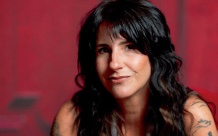
Romi Mayes
Romi Mayes has taken some hard knocks in her life, but she’s never faded away. For more than 25 years, Manitoba’s first lady of blues-rock has been a lynchpin of the Canadian roots scene. She earned that position the old-fashioned way, through her gritty, passionately emotive music. With her sizzling guitars and full-throated rasp, the Juno-nominated performer howls and purrs through razor-edged lyrics, rocking out wherever she can find a stage. She’s long been one of the hardest-working musicians on the circuit, keeping a busy slate of gigs and mentoring up-and-coming artists to get a foothold on the trails she blazed. Now, after a nine-year hiatus from the studio, Mayes has put her scintillating sound back on record with her long-awaited seventh album, Small Victories — a return that leaves no doubt, no matter the ups and downs, Mayes is here to stay.
Romi will be performing Friday, July 11, at 1:00 pm in Burr Oak.

Leonard Podolak (with Matt Gordon)
Ireland’s Matt Gordon is a fiddler and singer, whose fleet-footed clogging and thigh-slapping hambone has taken stages by storm since the 1980s. Leonard Podolak is a virtuosic master of the clawhammer banjo, who for decades has whipped up some of Manitoba’s wildest roots parties with his band, The Duhks. Put those talents together, and they can promise you this much: we’re all gonna have a real good time. Longtime friends and musical collaborators, Gordon and Podolak deliver an exhilarating trip through old-time Appalachian music. Their performances seamlessly blend intricate instrumental lines with heartfelt singing and dazzling dance. They’ve teamed up on a few records over the years, including 2020’s bigband extravaganza Power Wagon: Live At Shanley’s. But the best way to experience this duo’s toe-tapping, hand-clapping chemistry is to see it live.
Podolak and Gordon will be performing A concert with a side of clogging Sunday, July 13, at 3:00 pm in Folk School.
